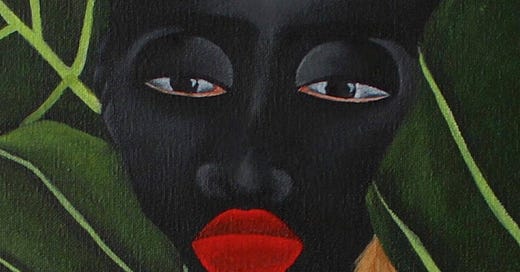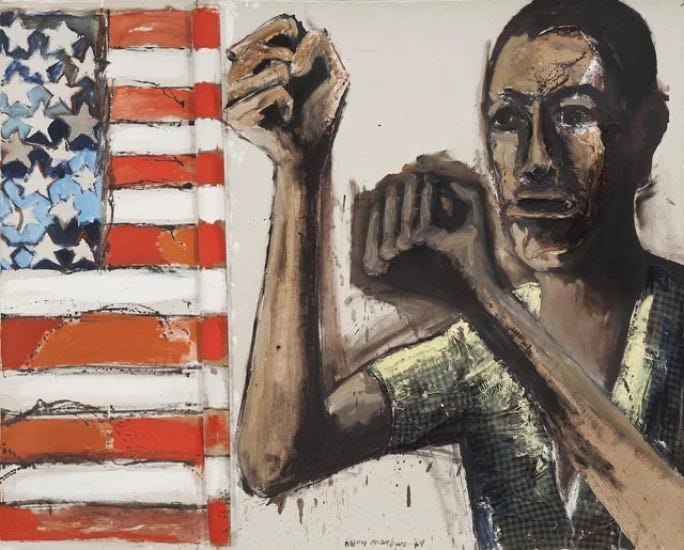Occasionally a display of racist violence is so brutal and grotesque that it forces South Africans to time travel. So it was in October last year, when the decomposing bodies of two women were found half-eaten on a pig farm in Limpopo Province, northeast of Johannesburg.
The notion that whites are suffering at the hands of Blacks in South Africa has captured international headlines for weeks now. And yet as indicated in the outlines of this story of land and poverty and racial traumas that remain unaddressed, the facts on the ground are very different. The ghosts of apartheid roam far too freely, despite what Elon Musk may say.
***
The women were Black.
The farmer accused of shooting them and throwing their bodies onto a pile of expired food for the pigs, was white.
He was (allegedly) assisted in the crime, by a man who worked for him, and that man was a migrant from Zimbabwe.
The news was shocking even as it was unsurprising. The history of South Africa makes it impossible for any of its residents to be racially innocent. The trauma of the past is prologue, or to put it in David Whyte’s more elegant prose,“the word now isn’t really equal to the reality we inhabit.” Now stretches backwards, and in moments of rupture like this one, when the past makes itself known, we are reminded that the present is the summation of all the days that have prepared us for this one.
And so, this story of the women and on this particular farm is like all the other stories South Africans live with each day: it is freighted with the inevitability of history’s march. And like most of our stories, it only makes sense because of the past.
If the dead women were white, the story would not make sense. But they were Black, which is also to say, in the context of rural South Africa, that they were poor. Not only were they Black and poor, they were also mothers which means they had responsibilities that extended beyond themselves and well into the future.
So, the poor black mothers whose present lives were tied to the past and to the future, walked from their homes, to a farm owned by a white man of means. Again, these details of the story matter. It would be strange if the farmer were Black, not because Black people are incapable of cruelty to others, but because so few Black people in South Africa are land-owning farmers.
The farmer was not just white, but quite specifically Afrikaner; a descendant of the Dutch whose people were granted permission to live in South Africa in 1994 as equal political citizens under extremely favourable economic and cultural terms. These same farmers have now been granted special rights to apply to leave South Africa and go to America because apparently, they are victims of racialized crimes on the basis of their skin colour. We will address this later.
But on that day in October, on that farm, the two women were picking through a pile of waste deemed fit enough only for animals. They had done this before: everyone knew that a neighbouring farm often dumped expired food at the pig farm. They were hoping to find cartons of yogurt and other dairy products to take home to their children and maybe to sell. The farmer did not like this. He had accused them and other community members of trespassing. The food was for his pigs, not for people. The land on which it was dumped was his, not theirs.
On the day he shot them (allegedly), I imagine that white farmer was fed up. It is hard to possess so much when you are surrounded by people who have so little. You end up resenting them for reminding you of their suffering.
I imagine that he came upon them talking to one another, laughing perhaps, as they worked to find something to salvage. Or maybe he had been scouting, prepared to catch them defying his repeated orders not to set foot on his land. In any case, there they were and there he was and the mode of their survival was offensive to him. I allege. And so, he and his farm manager shot them and killed them and dumped their bodies on top of the food and fed them to the pigs. Allegedly.
Forgive me the graphic nature of this description. In light of the violent histories so many of us have endured, I don’t invoke racial violence lightly. But we are living in awful times and sometimes the point must be made not with subtlety, but with the full ugliness of the truth.
***
Last month Donald Trump’s White House issued a statement in which he offered asylum to resettle ‘Afrikaner refugees,’ in America. he title itself is worth a chuckle. It is called Addressing Egregious Actions of the Republic of South Africa. The statement notes South Africa’s “countless…policies designed to dismantle equal opportunity in employment, education, and business, and hateful rhetoric and government actions fueling disproportionate violence against racially disfavored landowners.”
This is a familiar story. Indeed, since the end of apartheid, a certain kind of white South African has been inventing this story of ‘disfavour.’ The facts of white privilege and Black disadvantage have no impact on this white victimhood. The difference today is that this old narrative is globally ascendent, propelled by the convergence of white American MAGA-inflected victimization and a series of well-resourced Afrikaner tours that have been touting faux suffering since the early 2000s.
And so here we are, with South Africa now firmly in the American spotlight because America’s narrowly-elected President has noticed us for a few reasons. We have come to his attention because his unelected deputy-clown Elon Musk was born and raised in the country, and he has demonstrated the kind of adolescent antipathy towards South Africa, that is common amongst radicalised online incels. Trump is a long-term racist who trafficks in the kinds of racist horror stories that white supremacists love to invoke about South Africa and so because of this, we are mildly interesting to the bully.
But the escalating war of words is about much more than garden-variety racist attitudes. The expulsion of South Africa’s ambassador to the US is about the fact that in the White House’s own words, contained in its February 7th announcement of the Afrikaner refugee program, America believes:
“South Africa has taken aggressive positions towards the United States and its allies, including accusing Israel, not Hamas, of genocide in the International Court of Justice, and reinvigorating its relations with Iran to develop commercial, military, and nuclear arrangements.”
It is not only that South Africa has accused Israel of genocide, it is that the country has dared to say the US government’s withdrawal of aid money is absolutely fine since we can take care of ourselves.
I don’t often agree with my xenophobic health minister but his statement on the defunding of health projects in South Africa was spot on. He said Trump owes us nothing. And Professor Salim Abdool Karim, an internationally renowned researcher and head of an Aids research centre in Durban, concurred. "It is not the responsibility of American taxpayers to look after our patients."
So, the problem America has is that South Africa is running its big mouth despite its geographic size and lack of money. Worse yet, all of this noise is coming from a pesky democratically-elected government run by too many Blacks.
An assertive South Africa that feels no need to pander to the West, is a South Africa that puts itself on a path to becoming an enemy of the United States. In today’s climate, this is the only moral course of action.
In real politic terms of course South Africa will not want to antagonise America too much. We will probably replace Rasool with an ambassador who has a more acceptable face – no doubt the opposition/coalition lead partner the Democratic Alliance will be fighting to get a white man sent to America to represent us.
The colour of the person doesn’t matter of course, what will matter is that South Africa holds firm to its principles. If we maintain our moral authority on this matter and insist on continuing down the path of holding the state of Israel to account for its crimes against Palestinians, then the US may well cut diplomatic ties with us.
Trump is exceedingly good at understanding where power lies, and in picking a fight with South Africa he has correctly surmised that despite the many contradictions present in the country’s politics, we still represent the radical possibility of a politics built on justice. The ANC been a bitter disappointment of course, but in moments like this we are reminded of the promise South Africa once held.
Our case against the state of Israel must proceed, and Trump’s attempts to bully us into withdrawing or muzzling ourselves must fail. Maintaining our solidarity is not simply about principles — it is also about our relationship to history.
South Africans often talk about the debt we owe to those who fought and died for our freedom. To this we must add a new set of responsibilities. We must now begin to ask what we owe those who live in conditions of oppression and injustice to which we are so highly attuned. We must ask too, what we owe to the future.
The answers are surprisingly simply. We owe those who suffer today our solidarity and friendship, we owe them our energy and time as we seek to fight for their lives. We owe the future the same. We owe those who will come after we are gone the certainty of our courage, and the knowledge that we fought for them. We fought for them to have land and dignity, to have trees and rivers to sustain them. If all this is true, then owe them a fight against Trump that is far bigger than the one currently being mounted.
In our darkest days, South Africans knew we would triumph against apartheid and in this way we have always been time travellers. It’s time to set sail again. In these turbulent waters, we head for a different destination than the one America threatens. We head to a future in which there is a just and lasting peace for Palestinians. In this future the genocidaires of Israel and America are behind bars and Palestine is well and truly free.






The perpetuation of racial violence and inequality in South Africa is a stark reminder of the country's unfinished business in confronting its apartheid past. The brutal killings of the two Black women on the pig farm are a chilling echo of the countless atrocities committed during apartheid, where Black bodies were similarly dehumanized and disposed of with impunity.
The fact that such incidents continue to occur with alarming regularity, coupled with the brazen denial of white privilege and victimhood, speaks to the entrenched nature of systemic racism in South Africa. It is a stark reminder that the country's democratic transition was merely a first step towards justice, and that the struggle for true equality and reconciliation remains an ongoing and fraught process.
As we reflect on these tragic events, it is essential that we acknowledge the ways in which historical trauma continues to shape the lives of Black South Africans, and that we commit to dismantling the structures of oppression that perpetuate racial violence and inequality. Anything less would be a betrayal of the sacrifices made by those who fought for freedom and justice.
Thank you for writing about this issue (ongoing racism in South Africa) so succinctly. It’s horrific, and now coupled with Islamophobia. About Trump’s white messiah complex—I’m truly speechless. Will share this far and wide